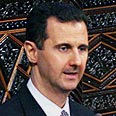
IAEA examines Syria bombing site photos
Diplomatic sources say UN experts scrutinizing satellite photos of site attacked by Israeli Air force jets in September; no conclusive results yet. Earlier, Washington Post reported Syria eliminating evidence at site of attack
UN experts have been provided satellite imagery of the site struck last month by Israeli warplanes and are analyzing it for signs that it might have been a secret nuclear facility, diplomats said Friday.
One of the diplomats indicated that the photos came from US intelligence. Another said the images, which have been studied by experts of the International Atomic Energy Agency since being received on Thursday, do not at first examination appear to substantiate reports that the target was a nuclear installation, but emphasized that the images were still being looked at.
The diplomats, who were briefed on the agency's receipt of the images, spoke to The Associated Press on condition of anonymity because their information was confidential. Officials of the Vienna-based nuclear watchdog said they had no comment.
The new inquiry holds great importance, as this is the first time an independent body is looking into evidence from the site attacked in Syria in an attempt to identify its essence. Syria denies the existence of a nuclear program in the country and officials in Damascus have previously said Israel attacked an empty structure in September.
'Syria eliminating evidence'
Syria has begun dismantling the remains of a site Israel bombed on September 6, the Washington Post reported Friday, quoting US and foreign officials familiar with the aftermath of the attack.
According to the report, the Syrians may be attempting to prevent the location from coming under international scrutiny.
The dismantling of the damaged site, which appears to be still underway, could make it difficult for weapons inspectors to determine the precise nature of the facility and how Syria planned to use it, the Washington Post said.
Based on overhead photography, the officials told the paper that the site in Syria's eastern desert near the Euphrates River had a "signature" or characteristics of a small but substantial nuclear reactor, one similar in structure to North Korea's facilities.
According to the report, the bombed facility is different from the one Syria displayed to journalists last week to back its allegations that Israel had bombed an essentially an empty building, said the officials, who insisted on anonymity because details of the Israeli attack are classified.
While US officials express increasing confidence that the Syrian facility was nuclear-related, divisions persist within the government and among weapons experts over the significance of the threat.
According to the Washington Post, while expressing concern over the prospect that Syria may have decided to launch a nuclear program in secret, some weapons experts question why neither Israel nor the United States made any effort before the secret attack – or in the six weeks since – to offer evidence to the International Atomic Energy Agency, a move that would trigger an inspection of Syria by the nuclear watchdog.
'Strong message to Iran'
But John R. Bolton, the Bush administration's former ambassador to the United Nations, said Syria's secrecy – including its apparent move to clean up the site after the bombing – suggests that Damascus is pursuing a strategy similar to that of Iran, which the Bush administration believes is pursuing a nuclear weapons capability, the report said.
"The common practice for people with legitimate civilian nuclear power programs is to be transparent, because they have nothing to hide," Bolton said.
According to the Washington Post, some experts speculate that Israeli and US officials may have calculated that reporting their intelligence to the IAEA would have produced only limited repercussions, the equivalent of a diplomatic slap on the wrist to Syria, which might have decided to build the facility anyway.
Foreign sources familiar with the attack told the paper Israel wanted to send a strong message to Iran about the price of developing a secret nuclear program. Israel is increasingly alarmed about Iran's intentions and frustrated that the international community has not persuaded Tehran to suspend its uranium enrichment program.
Israel and the US continue to refrain from officially addressing the Israeli airstrike. US President George W. Bush was asked about it several times during press conferences he held at the White House and refused to comment, as did Defense Minister Ehud Barak, who was asked about the attack by American reporters he met during his visit to the US this week.










